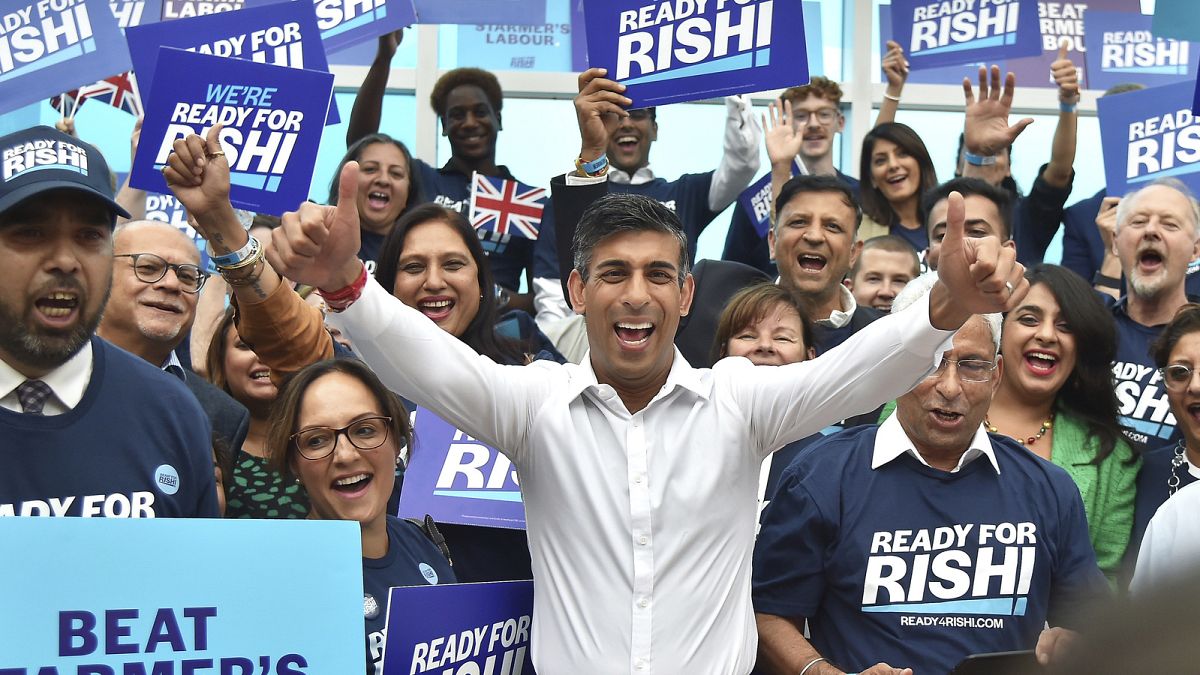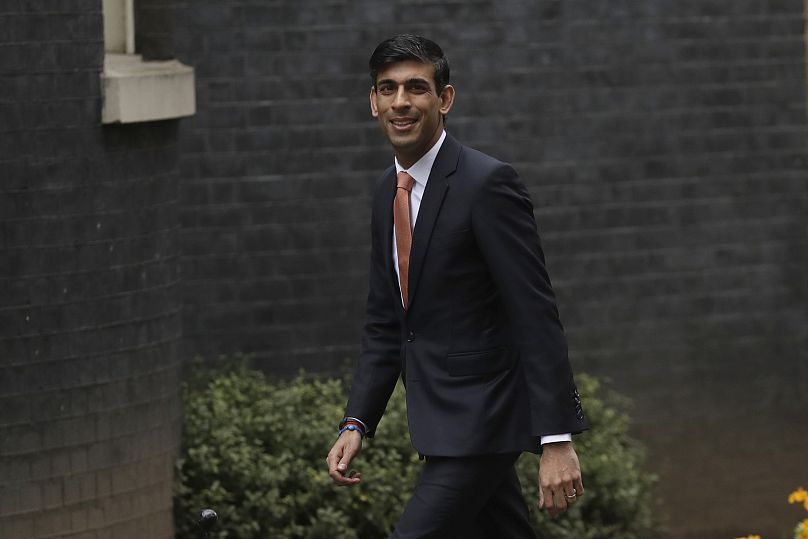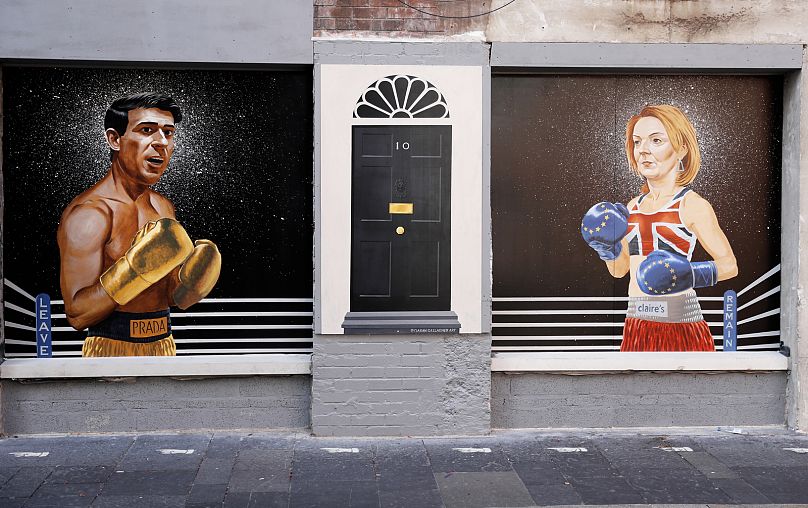Sunak was born in the coastal city of Southampton as the son of African immigrant parents of Punjabi-Indian descent.
Rishi Sunak is set to become the UK's third prime minister in a year after Liz Truss's 44-day-long premiership came to an abrupt halt last Thursday.
He had previously run, and lost, against Truss in a Conservative Party leadership race in August, triggered by Boris Johnson's scandal-induced resignation.
Sunak ended up winning the latest selection round after opponents -- including Johnson -- pulled out.
As Sunak heads to 10 Downing Street in the midst of a deepening political hurricane, we take a quick look at the 42-year-old former finance minister's background and policies.
What is Sunak's background?
Sunak was born in the coastal city of Southampton as the son of African immigrant parents of Punjabi-Indian descent. Upon entering office, Sunak will thus become the UK's first Hindu and non-white prime minister.
Raised by an upwardly mobile family, the soon-to-be PM attended some of Britain's most exclusive academic institutions, where he rubbed shoulders with the country's aristocracy.
Following a private ("prep") primary education, he headed off to Winchester -- a centuries-old secondary school in the south of England with a £46,000 (€53,000) annual tuition fee for boarding pupils -- and went onto read Politics, Philosophy and Economics (PPE) at Lincoln College, Oxford. He finished his studies with an MBA at Standford University after winning a Fulbright Scholarship.
Sunak's own personal background has come under significant media scrutiny, with detractors branding him as "privileged" and far removed from the struggles of ordinary Britons.
To add fuel to the fire, a recently resurfaced clip from a 2001 BBC documentary on Britain's middle classes depicts a young Sunak -- then an Oxford student -- talking about his social circle and denying he had "working-class" friends.
His luxurious private life has also been under the spotlight, with reports emerging in the British media of a lucrative Goldman Sachs job position he held in his early twenties, links to Cayman Islands-based investment funds, and lavish living arrangements in California.
Indeed, Sunak and his wife, IT heiress Akshata Murty, landed in the 222nd spot of The Sunday Times's 2022 list of richest Britons, with a combined net worth of £730 (€834) million. The latter was embroiled earlier this year in a widely-publicised tax-related scandal over her status as a non-domiciled UK resident.
In response to press commentary about Sunak's upbringing and lifestyle, his team have stated: "Rishi is the product of a lot of hard work, kindness and sacrifice... He is dedicated to this country because of the opportunity it gave to him, his parents and his grandparents who moved here for a better life."
'Eat Out to Help Out': Sunak's political history
Sunak has been involved in Conservative politics since his student days, interning at the party's campaign headquarters while completing his undergraduate studies. Nevertheless, he would only become MP in October 2014, representing the Richmond (Yorks) constituencies in the north of England.
The soon-to-be premier landed his first cabinet position in 2019, becoming the chief secretary to the Treasury -- a ministerial role second to the Chancellor of the Exchequer (finance minister) -- in Boris Johnson's first government.
But less than a year later, Sunak -- heralded as a "rising star" by the press and endorsed by Johnson’s former strategist, Dominic Cummings -- became Chancellor of the Exchequer himself, the role he remains known for.
During his tenure as finance minister, Sunak found himself grappling with the COVID-19 crisis, which hit Britain in March 2020.
At a time in which Johnson’s own popularity oscillated between scandals and brief surges of support, Sunak emerged as a fresh-faced, likeable figure, whose proposals to inject much-needed cash into Britain’s COVID-stricken businesses proved popular with the public.
The most notable of these financial support packages was the "Eat Out to Help Out" scheme, launched in the summer of 2020. Through the programme, the government partially subsidised food and non-alcoholic drinks at restaurants and pubs across the country.
Such incentives, nevertheless, clashed with the pandemic-related guidelines and recommendations of health officials, and were seen as plunging Britain back into a second wave of COVID infections come the autumn.
Sunak eventually resigned from the position on 5 July 2022, a mere two days before Johnson, citing fundamental differences between his economic vision and that of the prime minister.
Later this summer, he ran against Truss. He made it to the final round but lost after his opponent obtained 57.4% of the Conservative Party members’ votes.
What are Sunak’s policies and plans to tackle Britain’s crises?
As Britain endures one of the most turbulent years in its political history, with a cost-of-living crisis and soaring inflation on the horizon, many are wondering: what does the newly-appointed PM stand for and what are his policies?
Sunak may have said little so far regarding his immediate plans to handle Britain’s pressing problems, other than acknowledging the “profound economic crisis” the country faced, but his overall approach will likely stand in stark contrast to that of his Thatcher-aspiring predecessor, Truss.
The former Chancellor is frequently perceived as a pragmatist and as belonging to the centre-ground of the Conservative Party.
He has opposed the fiscal policies of Truss and her Chancellor, Kwasi Kwarteng, whose tax cut proposals plunged the country into economic chaos and caused the pound to plummet.
Sunak also campaigned to leave the European Union in the 2016 Brexit referendum, but his outlook is seen as more reconciliatory than that of many in the party, including Truss herself - who formerly campaigned to remain in the bloc.
His approach to Russia, despite being perceived as being somewhat “softer” and less impassioned than Truss’s, follows a largely similar line, as he vows to maintain his support of Ukraine and economic sanctions against Moscow while refusing to intervene militarily in the conflict.
The big tasks that lie ahead for Sunak will be to restore confidence among foreign investors while trying to keep the Conservative Party together, as its internal stability is shaken and it hits an all-time low in opinion polls.




